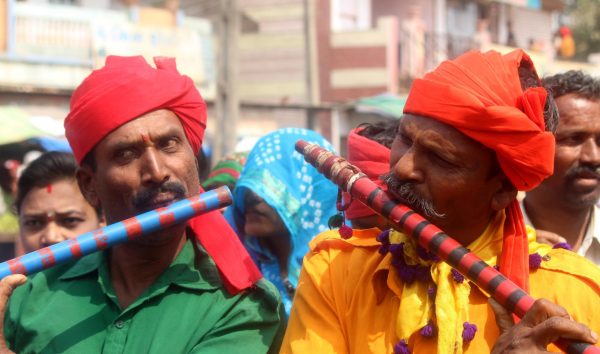Gamelan and Bali Dance Group Perform at Finney Chapel
One of the most respected Balinese performing companies, Çudamani, came to Oberlin to perform in Finney Chapel last Tuesday. The 18-member company is internationally recognized, and their Oberlin performance was part of their world tour. The group name Çudamani means “to do something with your whole heart without expecting something in return,” according to the group’s website. Watching their performance, it’s easy to see this goal come to life through their passion. The performance integrated costumes, dancing, vocal performances, and Gamelan, which is music played using traditional Indonesian instruments. Each of their performances had a specific theme. “Teruna Gandrung” showcases a tradition of challenging gender norms, featuring women in energetic, fearless, and powerful roles. Another piece called “Ramayana Wayang Wong” featured two people dressed in red and yellow, wearing masks. The story followed twin brothers who jumped into a pool of water while fighting over a chalice. After they fell into the water, they turned into monkeys. There were also sections in which dancers improvised their movements and signaled to the percussionists to change the tempo and melody. In order to communicate while on stage, performers made eye contact with each other and smiled. “We are told to put ourselves into the story but not just technical movements, so we don’t practice with mirrors, because my teacher said that it is better to feel your partner than watch them in the mirror,” said Dewa Ayu Eka Putri, one of the dancers and the group’s secretary. In addition to performing, Çudamani holds workshops wherever they tour including at Oberlin this past week. “Çudamani told not only traditional dramas but also shared stories about their community and philosophy of collective care,” College fourth-year Kara Nepomuceno, a Dance major studying Southeast Asian dance, wrote in an email to the Review. “In [the] workshop held on Wednesday morning, Associate Director Emiko Saraswati Susilo described how the group collectively owns the instruments at their home base of Banjar Pengosekan.” The group also has permanent summer programs in Bali that teach people about their dances and instruments in order to preserve their traditions and spread knowledge of their culture.


![One of the most respected Balinese performing companies, Çudamani, came to Oberlin to perform in Finney Chapel last Tuesday. The 18-member company is internationally recognized, and their Oberlin performance was part of their world tour. The group name Çudamani means “to do something with your whole heart without expecting something in return,” according to the group’s website. Watching their performance, it’s easy to see this goal come to life through their passion.
The performance integrated costumes, dancing, vocal performances, and Gamelan, which is music played using traditional Indonesian instruments. Each of their performances had a specific theme. “Teruna Gandrung” showcases a tradition of challenging gender norms, featuring women in energetic, fearless, and powerful roles. Another piece called “Ramayana Wayang Wong” featured two people dressed in red and yellow, wearing masks. The story followed twin brothers who jumped into a pool of water while fighting over a chalice. After they fell into the water, they turned into monkeys.
There were also sections in which dancers improvised their movements and signaled to the percussionists to change the tempo and melody. In order to communicate while on stage, performers made eye contact with each other and smiled.
“We are told to put ourselves into the story but not just technical movements, so we don’t practice with mirrors, because my teacher said that it is better to feel your partner than watch them in the mirror,” said Dewa Ayu Eka Putri, one of the dancers and the group’s secretary.
In addition to performing, Çudamani holds workshops wherever they tour including at Oberlin this past week.
“Çudamani told not only traditional dramas but also shared stories about their community and philosophy of collective care,” College fourth-year Kara Nepomuceno, a Dance major studying Southeast Asian dance, wrote in an email to the Review. “In [the] workshop held on Wednesday morning, Associate Director Emiko Saraswati Susilo described how the group collectively owns the instruments at their home base of Banjar Pengosekan.”
The group also has permanent summer programs in Bali that teach people about their dances and instruments in order to preserve their traditions and spread knowledge of their culture.](https://oberlinreview.org/wp-content/uploads/2019/10/GamelanDance_OfficeofComms_WEB-900x577.jpg)








